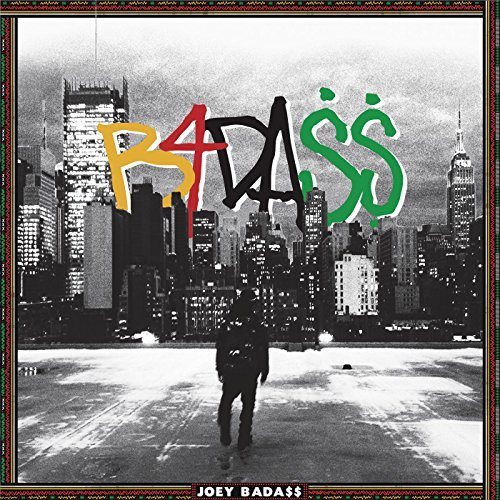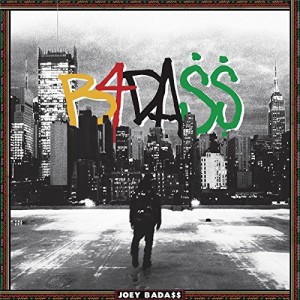
By: Sam Fatula | A&E Editor

In a very short amount of time, Brooklyn’s own Jo-Vaughn Virginie Scott, better known by his stage name Joey Bada$$, has become the most highly recruited hip-hop artist by major labels since the dawning of the digital age. Not everyone gets asked to sign with Jay-Z at age 17. He released one of the most circulated mixtapes of 2012 called 1999, pre-emptively crowning the teenager as the savior of traditional hip-hop; the Nas of our generation.
Quite a title for someone who had yet to release a full-length album, but the unbounded potential of an artist that emphasizes social consciousness at such a young age only brought unbridled anticipation for future Joey Bada$$ projects. That wait is over with the independent release of B4DA$$, which hit store shelves on Tuesday to celebrate Joey’s 20th birthday.
B4DA$$ picks up directly where Joey’s mixtapes 1999 and Summer Knights left off; paying homage to the rap genre with exclusive beats that sound directly handpicked from the 1990s era a la DJ Premier, Statik Selektah, the late J Dilla and a guest performance from The Roots. The majority of the 15-track release are powered by a standard snare drum beat, a simple piano melody and occasional record scratches.
While the simple technique works for Joey, and albeit refreshing to hear in comparison to overused trap beats from the likes of A$AP Ferg, Rae Sremmurd, etc., the tempo rarely fluctuates. As a result, the transition from songs “Hazeus View” and “Like Me” seem to drag on a bit. The short variety in tempo are only salvaged by Joey’s ability to provide a solid hook in “Hazeus View,” in which Joey is trying to come at peace with the recent deaths of long-time friends and collaborators Capital Steez and Egbert “Junior” Occuli.
This track also addresses Joey’s witty wordplay, using the homonym “Jésus” and “Hazeus” to juxtapose his on-and-off relationship with religion. It is creative songwriting and demonstrates his ongoing progression as a lyricist.
B4DA$$ continues on with tracks that criticize significant social topics, especially race. Following the deaths of Eric Garner and Michael Brown, Joey released single “No. 99,” an anthem that recreates the stereotypes of a violent black culture in conjunction with a corrupt police system. The production conjured by Statik Selektah is brash, aggressive and sonically personifies the tensions that rise in racial protests. The song only gains strength through Joey, who undertakes the persona of ‘Badmon,’ acting as a contemporary version of Malcolm X that desires equality in the form of violence. To take a sarcastic undertone of an urban stereotype, which is that black people act only in impulsive violence and smoke marijuana, is nothing short of brilliant.
Despite “No. 99” being an early candidate for hip-hop track of the year, B4DA$$ is not without its flaws. To be frank, it’s an inconsistent album across the board. Breakout singles like “Paper Trail$” and “Christ Conscious” are leaps and bounds ahead of a song like “Escape 120,” which attempts to vary production styles too late into the album. The track may be a victim to not drawing a consistent parallel to the rest of the album, and doesn’t seem to fit well with the first half of B4DA$$.
Perhaps the expectations for B4DA$$ were unattainable, although that’s not to say this release is a disappointment. If anything, this album can only make fans more excited for what else is to come from Joey and the rest of his crew from the Pro Era label. Something significant to take away from this first release is Joey’s clear progression as an artist, both sonically and lyrically. There are strains of excellence all over B4DA$$, it’s just not where critics had thought it would be.
Score: 7.8/10 (Follow @Sam_Fatula on Twitter for daily music & arts news)


